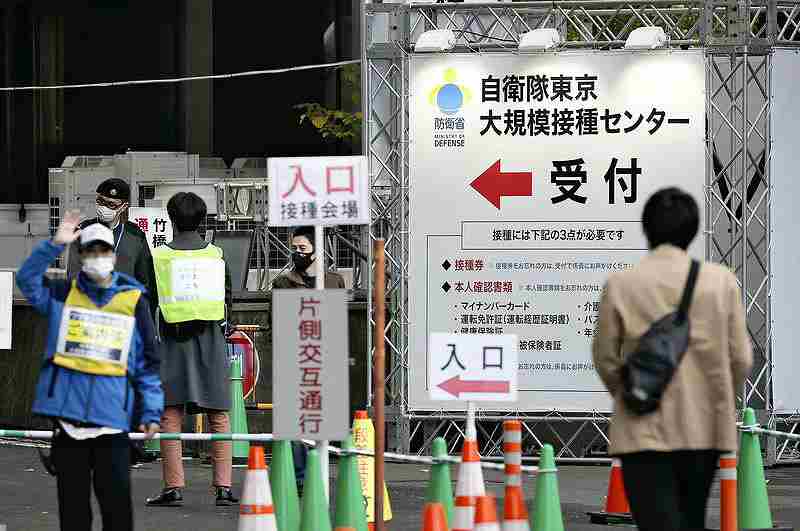
The mass vaccination site in Chiyoda Ward, Tokyo, operated by the Defense Ministry is scheduled to be closed at the end of this month.
November 11, 2021
Anxiety over the vaccination itself is believed to be the cause of the vast majority of side effects experienced among those vaccinated against the novel coronavirus at a mass vaccination site in Tokyo, an analysis by the Self-Defense Forces Central Hospital has found.
About 90% of the acute-phase side effects experienced by 2,930 people after receiving the vaccine at the Defense Ministry-administered vaccination site were believed to stem from stress accompanying anxiety over the vaccination.
Those in younger age group made up the largest share of those affected, according to the analysis carried out before the site in Chiyoda Ward, Tokyo, is scheduled to close at the end of this month.
As the Health, Labor and Welfare Ministry has not studied the causal relationship between stress and side effects, the hospital intends to make proposals to local governments and other entities for measures to improve operations at vaccination sites.
A 20-year-old male company employee living in Kawaguchi, Saitama Prefecture, who was at the site Monday for his second vaccination, said with an expression of relief, “As I was unable to make a reservation for the vaccination at a local medical facility, it was helpful that the site has remained open until now.”
But, the man added, “I’m worried again about side effects for the second shot because the vaccine is so new.”
The Defense Ministry opened the mass vaccination site in Tokyo on May 24, and was the first to use the vaccine produced by Moderna Inc. in the country. Its efforts included collecting data on side effects.
A total of 1,201,688 people were vaccinated through Sept. 24. An analysis showed that 2,930 people, or 0.24%, developed side effects in the acute phase — within 30 minutes of receiving the shot — such as rashes or feeling unsteady. Women accounted for 1,998, or 68.2%, of the cases. They all eventually recovered, and none experienced the more serious anaphylactic shock.
Additionally, of those who had acute-phase side effects, 2,601, or 88.8%, appeared to have stress-induced reactions. This was seen in symptoms including hyperventilation due to extreme nervousness or anxiety, or what is known as a “vasovagal reflex” such as fainting or lowering of blood pressure.
Such side effects were prevalent among younger people, with those in the 20-34 age group accounting for more than one-third of the total. They included one case in which the person fainted and fell on their head, and had to be taken by ambulance to a hospital.
The Self-Defense Forces Central Hospital plans to compile the data in a paper and submit it to a scientific journal.
“The vaccine is considered to be safe, but it became clear that a certain number of people felt stress over being vaccinated,” said Col. Shuichi Kawano of the Ground Self-Defense Force, who was in charge of the mass vaccination site. “It may indicate that the younger they are, the more likely they are to feel anxiety.”
In the future, the hospital intends to propose reforms such as asking on the vaccination application form if the person is feel anxiety and perhaps having those who answer yes to lie down for the vaccination.
The hospital also analyzed the side effect referred to as “Moderna arm,” in which the arm becomes swollen or red few days after the vaccination. Looking at 42,017 people who came to the site for their second dose from July 1-7, it found that 2.369, or 5.6%, had had such a reaction.
The symptoms appeared four to 21 days after vaccination, with most occurring after seven days. Recovery took from one to 34 days, with the largest percentage coming after five days.
Among those who had such symptoms, women accounted for 1,950, or more than 80%. The hospital speculated that the higher rate for women could be due to gender differences in immune capacity, hormones and lifestyle habits.
“As it is easy to deal with reactions induced by mental stress from being vaccinated, [authorities] should be better informed about them,” said Hiroyuki Moriuchi, a professor of infectious diseases at Nagasaki University. “By gaining more detailed data based on age and gender, it will give us a better idea of which groups should receive more attention and lay the foundation for how mass vaccination should be carried out.”
Top Articles in Society
-

Man Infected with Measles Reportedly Dined at Restaurant in Tokyo Station
-

Man Infected with Measles May Have Come in Contact with Many People in Tokyo, Went to Store, Restaurant Around When Symptoms Emerged
-

Woman with Measles Visited Hospital in Tokyo Multiple Times Before Being Diagnosed with Disease
-

Australian Woman Dies After Mishap on Ski Lift in Nagano Prefecture
-

Foreign Snowboarder in Serious Condition After Hanging in Midair from Chairlift in Nagano Prefecture
JN ACCESS RANKING
-

Japan PM Takaichi’s Cabinet Resigns en Masse
-

Japan Institute to Use Domestic Commercial Optical Lattice Clock to Set Japan Standard Time
-

Israeli Ambassador to Japan Speaks about Japan’s Role in the Reconstruction of Gaza
-

Man Infected with Measles Reportedly Dined at Restaurant in Tokyo Station
-

Videos Plagiarized, Reposted with False Subtitles Claiming ‘Ryukyu Belongs to China’; Anti-China False Information Also Posted in Japan






















